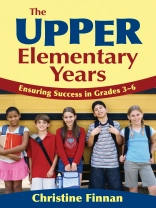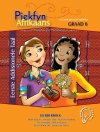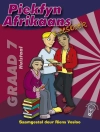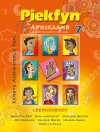‘This book reminds me that I became a fifth grade teacher because that time in a child′s life is amazing and critical. This book should be required reading for every teacher, especially ones going into the upper elementary grade levels.’
—Tracy Pinnell, Fifth-Grade Teacher
Sheppard Accelerated Elementary School, Santa Rosa, CA
Help your upper elementary school students thrive and achieve!
A positive educational experience in the upper elementary years sets the stage for a child′s long-term success in school. With increased testing and accountability requirements, upper elementary teachers are challenged to help students master required content while responding to each child′s unique needs and way of learning. This inspiring book presents a child-centered teaching approach for Grades 3–6, one that helps build students′ sense of confidence, belonging, and accomplishment.
Written by a passionate advocate for upper elementary students, this guide offers teachers detailed information about child development and effective teaching practices uniquely targeted for 8- to12-year-olds. Readers will find:
- A thorough look at how upper elementary children develop as learners, based on comprehensive research
- Teaching strategies and assessment techniques to help students master upper elementary curriculum
- A discussion of diversity issues, including race and ethnicity, gender, socioeconomic background, language, and exceptionalities
- Informative case studies and firsthand insights from students, teachers, and administrators
Gain the knowledge you need to grow professionally and serve your upper elementary students more effectively.
表中的内容
Preface
Purpose and Audience
Background
Organization of the Book
Data Sources and Collection
Acknowledgments
About the Author
1. Why Focus on Upper Elementary Grades and Students?
Upper Elementary Children and Grade Levels
Defining Upper Elementary Teachers: Their Practice and the Profession
Advocating for Upper Elementary Students
2. Development of 8- to 12-Year-Old Children
Development as Learners
Cognitive Development
Language Development
Development as Individuals and Members of Society
Development of Sense of Self
Autonomy and Relatedness
Doing What Is Right
Physical Development
Refining the Broad Strokes of Generalizations
3. Children as Members of Groups
Situating Group Differences: Biological, Cultural, and Societal Influences
Biological Influences
Cultural Influences
Social, Historical, and Economic Influences
Ethnic and Racial Group Affiliation
Race and Ethnicity: Relation to Achievement
Race and Ethnicity: Relation to Social Development
Socioeconomic Group Affiliation
Socioeconomic Influences on Achievement
Socioeconomic Influences on Social Development
English-Language Learners
English-Language Learners and Achievement
English-Language Learners and Social Development
Gender Affiliation
Gender and Academic Achievement
Gender and Social Development
Gender and Physical Development
Exceptional Learners
Achievement of Exceptional Learners
Social Development of Exceptional Children
The Holistic Child: Mixing Group Identities
4. Individual Developmental Differences
Individuals as Learners
Variation in Cognition and Intelligence
Variation in Motivation to Learn
Variation in Expressions of Creativity
Exceptional Variation
Variation in Development of Self-Concept and Social Competency
Physical Variation
Summary
5. Children’s Lives Outside of School
The Multiple Contexts of Children’s Lives
Family and Home
Friends and Peers
Neighborhood and Community
Other Important Contexts
How Children Spend Time Outside of School
Adult-Organized, Sponsored, or Supervised Activities
Child-Driven Activities
Summary
6. The School Environment: Supporting Accomplishment, Belonging, and Engagement
School Role in Developing a Sense of Accomplishment
Defining and Measuring Accomplishment
Adult Expectations for Accomplishment
Student Expectations for Accomplishment
School Role in Developing a Sense of Belonging
Inviting Spaces and Warm Adult Relations
Belonging Within the Peer Network
Extending the Sense of Belonging to Family
Extending Belonging to the Community
School Role in Engaging Students Academically, Socially, and Physically
Academic Engagement
Social Engagement
Physical Engagement
School Culture, Organizational Structures, Policies, and Procedures
Summary
7. The Classroom Environment: Supporting Accomplishment, Belonging, and Engagement
Classroom Role in Developing a Sense of Accomplishment
Academic Accomplishment
Social Accomplishment
Physical Accomplishment
Classroom Role in Developing a Sense of Belonging
Belonging in a Community
Joy and Cooperation
Democracy and Equity
Care and Nurture
Extending Community to Others
Classroom Role in Developing a Sense of Engagement
Academic Engagement
Social Engagement
Physical Engagement
Summary
8. Teaching and Learning
Important Knowledge
Addressing What Students Are Expected to Know
Addressing Student Interest and Knowledge
Using Knowledge to Meet Student Needs for Accomplishment, Belonging, and Engagement
Selecting or Designing Appropriate Assessments
Assessing Acquisition of Desired Knowledge
Assessing Students′ Prior Knowledge and Knowledge Assimilation
Using Assessment to Meet Diverse Students′ Needs for Accomplishment, Belonging, and Engagement
Delivering Instruction
Teaching the Content
Teaching the Students
Using Instruction to Meet Diverse Students′ Needs for Accomplishment, Belonging, and Engagement
Importance of Aligning Content, Instruction, and Assessment
Putting the Pieces Together
Issues Surrounding Teaching and Learning
Aligning Content, Assessment, and Instruction to Promote Accomplishment, Belonging, and Engagement
9. Supporting Upper Elementary Students: Developmentally Appropriate Practice, Professionalism, and Advocacy
A Framework of Upper Elementary Developmentally Appropriate Practice
Actions of Students
Actions of Teachers
Characteristics of the Classroom Environment
Characteristics of the Teaching and Learning Process
Professional Identity
Becoming Upper Elementary Teachers
Supporting Upper Elementary Teachers in the Profession
National Board Middle Childhood / Generalist Certification
Advocating for Upper Elementary Children
Compiling and Encouraging Research on Upper Elementary Children and Teaching
Examining Policies and Practices
What Can You Do to Help Upper Elementary Children?
Developmentally Appropriate Practice
Professional Identity for Upper Elementary Teachers
Advocacy
References
Index
关于作者
Christine Finnan holds a joint position as an associate professor in the Foundations, Secondary, and Special Education Department and the Anthropology Department at the College of Charleston in Charleston, SC. Prior to assuming this position, she was an associate professor in the Early Childhood, Elementary, and Middle Grades Department. In this capacity, she helped develop curriculum for a BS in elementary education, preparing graduates to work in second- to sixth-grade classrooms. Since 1990, Finnan has been involved in school reform initiatives, particularly the Accelerated Schools Project and more recently Partners for Acceleration. Using her anthropological lens, she examines the interplay between school and classroom culture and reform models. She works closely with teachers, observing in classrooms and providing professional development. Finnan coauthored Accelerating the Learning of All Children: Cultivating School, Classroom and Individual Change (Westview Press, 2000) with Julie D. Swanson and co-edited Accelerated Schools in Action: Lessons from the Field (Corwin Press, 1996) with Ed St. John, Jane Mc Carthy, and Simeon Slovacek and has published extensively in edited volumes and journals. Finnan’s joint appointment reflects her academic training and scholarship. She became interested in studying education through her research on children’s play and folklore. She completed a Master of Arts degree from University of Texas, Austin in anthropology and folklore. Her research focused on the study of third-grade children’s spontaneous play. Finnan completed a Ph D in education at Stanford University in 1980, focusing on anthropology and education. While at Stanford, she continued to study children’s play, examining how Vietnamese refugee children used play to assimilate into a new culture.












